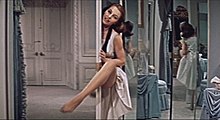fiction.wikisort.org - Movie
Silk Stockings is a 1957 American musical romantic comedy film directed by Rouben Mamoulian, based on the 1955 stage musical of the same name,[2] which itself was an adaptation of the film Ninotchka (1939).[3] It stars Fred Astaire and Cyd Charisse. The supporting cast includes Janis Paige, Peter Lorre, Jules Munshin, and George Tobias reprising his Broadway role.[4][5] It was choreographed by Eugene Loring and Hermes Pan.
| Silk Stockings | |
|---|---|
 Theatrical release poster | |
| Directed by | Rouben Mamoulian |
| Screenplay by |
|
| Based on | Silk Stockings by |
| Produced by | Arthur Freed |
| Starring | |
| Cinematography | Robert J. Bronner |
| Edited by | Harold F. Kress |
| Music by |
|
| Distributed by | Metro-Goldwyn-Mayer |
Release date | July 18, 1957 |
Running time | 117 minutes |
| Country | United States |
| Language | English |
| Budget | $2.6 million[1] |
| Box office | $2.8 million[1] |
It received Golden Globe Award nominations for Best Film and Best Actress (Charisse) in the Comedy/Musical category.[6]
The score was embellished with the new song "The Ritz Roll and Rock", a parody of then-emerging rock and roll. The number ends with Astaire symbolically smashing his top hat, considered one of his trademarks, signaling his retirement from movie musicals, which he announced following the film's release.
Plot
A brash American film producer, Steve Canfield, wants Russian composer Peter Illyich Boroff to write music for his next picture, which is being made in Paris. However, when the composer expresses his wish to stay in Paris, three comically bumbling operatives, Brankov, Bibinski, and Ivanov, are sent from Moscow to take Boroff back.
Canfield manages to corrupt them with decadent western luxuries (champagne, women, nightclubs, etc.) and talks them into allowing Boroff to stay. He also arranges for his leading lady, Peggy Dayton, to "convince" Boroff to cooperate.
Fearful of his own precarious position, a commissar at the Ministry in Moscow summons a dedicated and humorless, fanatical operative, Nina "Ninotchka" Yoschenko, to bring all four men back home. Canfield succeeds in romancing her, despite her determination not to fall prey to the decadent attractions of Paris. He even proposes marriage. She and Boroff are horrified when they realize what changes have been made to Boroff's music. They decide to return to Moscow.
Canfield does not give up, arranging for the pliable Brankov, Bibinski, and Ivanov to be sent back to Paris, knowing that they will be seduced again by the city's charms. Ninotchka is sent after them, giving Canfield time to convince her to give in to her love for him.
Cast

- Fred Astaire as Steve Canfield
- Cyd Charisse as Ninotchka Yoschenko
- Janis Paige as Peggy Dayton
- Peter Lorre as Brankov
- Jules Munshin as Bibinski
- Joseph Buloff as Ivanov
- George Tobias as Vassili Markovitch, Commisar of Art
- Wim Sonneveld as Peter Ilyitch Boroff
Songs
Music and lyrics by Cole Porter.
- "Too Bad"
- "Paris Loves Lovers"
- "Stereophonic Sound"
- "It's a Chemical Reaction, That's All"
- "All of You"
- "Satin and Silk"
- "Without Love"
- "Fated to Be Mated"
- "Josephine"
- "Siberia"
- "The Red Blues"
- "The Ritz Roll and Rock"
Production
MGM bought the film rights to the musical for $300,000. Dance rehearsals started on September 18, 1956, and filming ended January 31, 1957.[7]
Reception
According to MGM records, the film earned $1,740,000 in the U.S. and Canada and $1,060,000 in other markets, resulting in a loss of $1,399,000.[1]
The film is recognized by the American Film Institute in these lists:
- 2004: AFI's 100 Years...100 Songs:
- "All of You" – Nominated[8]
- 2006: AFI's Greatest Movie Musicals – Nominated[9]
See also
- List of American films of 1957
References
- The Eddie Mannix Ledger, Los Angeles: Margaret Herrick Library, Center for Motion Picture Study.
- "Silk Stockings". Broadway Musical Home. Retrieved August 19, 2016.
- "Ninotchka". Turner Classic Movies. Retrieved October 12, 2022.
- "Silk Stockings". Turner Classic Movies. Retrieved October 12, 2022.
- Crowther, Bosley (July 19, 1957). "The Screen: 'Silk Stockings' Arrives; Fred Astaire and Cyd Charisse Co-Star". The New York Times. Retrieved September 8, 2017.
- "Golden Globes 1957". Sijmen's List of Film Classics. Retrieved September 8, 2017.
- Nat Segaloff, Final Cuts: The Last Films of 50 Great Directors, Bear Manor Media 2013 p 182-184
- "AFI's 100 Years...100 Songs Nominees" (PDF). Retrieved 2016-08-13.
- "AFI's Greatest Movie Musicals Nominees" (PDF). Retrieved 2016-08-13.
External links
- Silk Stockings at IMDb
- Silk Stockings at AllMovie
- Silk Stockings at the TCM Movie Database
- Silk Stockings at the American Film Institute Catalog
На других языках
- [en] Silk Stockings (1957 film)
[ru] Шёлковые чулки (фильм)
«Шёлковые чулки» (англ. Silk Stockings) — цветной, широкоэкранный (система «Синемаскоп») музыкальный фильм 1957 года компании MGM и Arthur Freed Production. Ремейк фильма «Ниночка» с Гретой Гарбо. Экранизация мюзикла «Шёлковые чулки» (англ.) по книге Джорджа Кауфмана, Лилин МакГраф и Абе Барроуз.Другой контент может иметь иную лицензию. Перед использованием материалов сайта WikiSort.org внимательно изучите правила лицензирования конкретных элементов наполнения сайта.
WikiSort.org - проект по пересортировке и дополнению контента Википедии